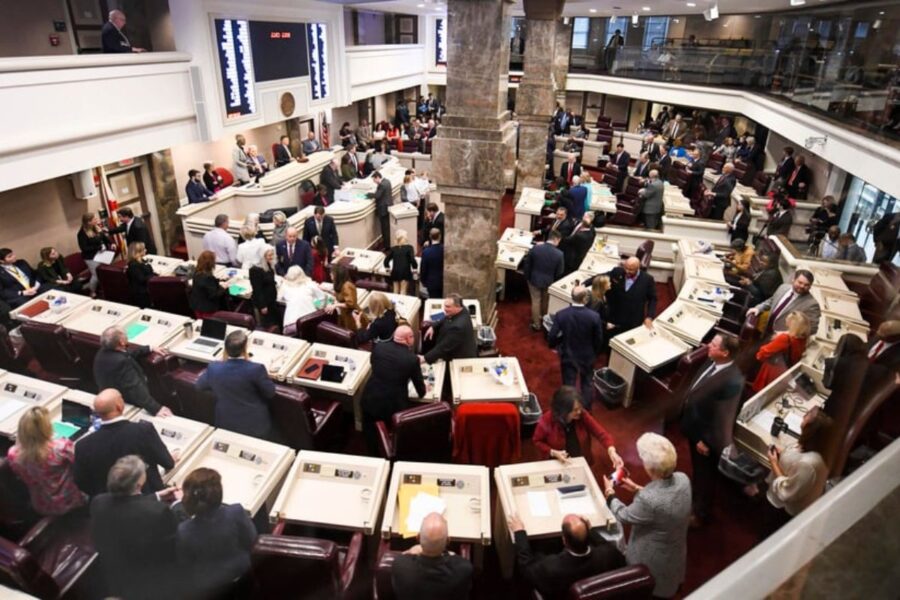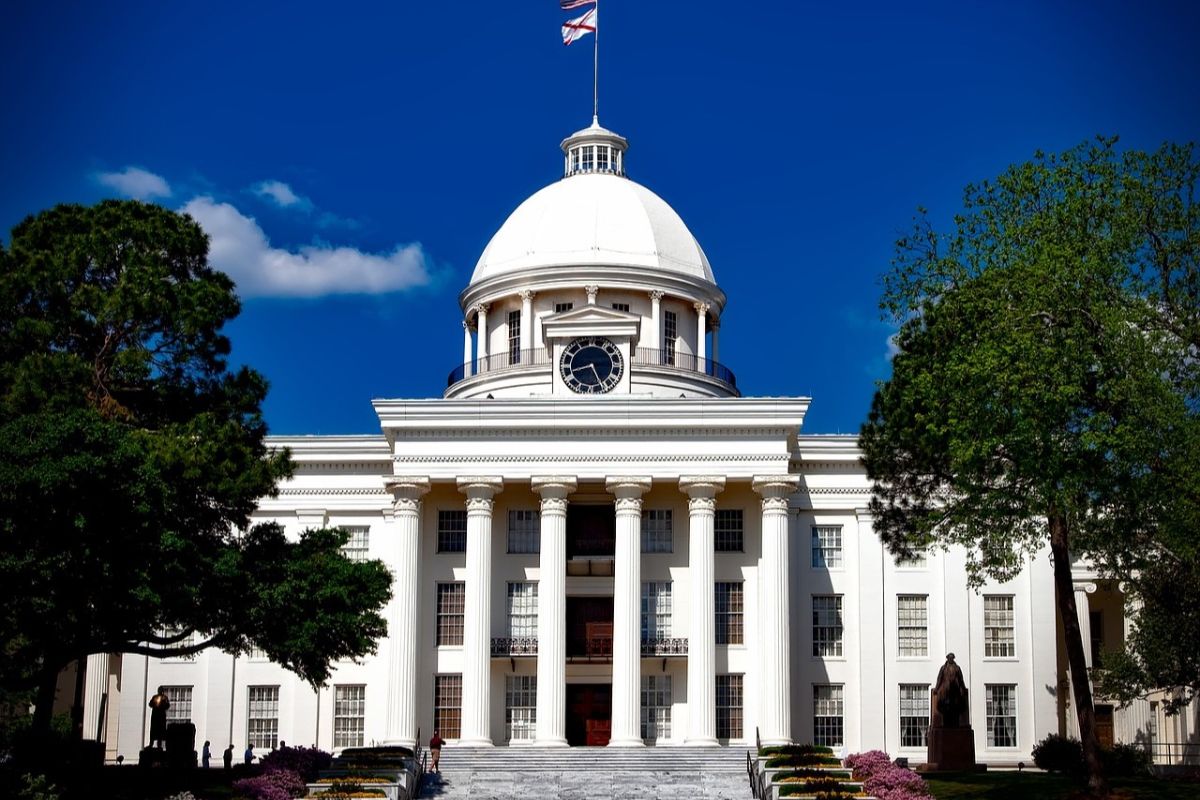Alabama Senate Passes Bill: The recent passing of a bill by the Alabama Senate, assigning a political board to oversee the Archives Department, has stirred significant debate within the state. This move, embodied in Senate Bill 10, has sparked concerns regarding the potential impact on the preservation and accessibility of historical records.
With implications reaching beyond mere administrative restructuring, the decision raises questions about the intersection of politics and historical documentation, prompting reflections on the broader implications of government interference in archival affairs.
The ramifications of this bill are far-reaching, inviting a closer examination of its potential consequences on the integrity of Alabama’s historical records.
Key Takeaways
- SB77 transitions ADAH board to politically appointed, raising concerns about political influence.
- Critics fear compromise of ADAH’s integrity and autonomy under politically chosen board.
- SB77 seen as response to perceived ‘social agenda’ at ADAH event on LGBTQ+ history.
- Broader discussions on impact of SB77 on marginalized communities’ representation in historical narratives.
Alabama Senate’s Approval of Controversial Bills
The recent approval by the Alabama Senate of two controversial bills, SB77 and SB10, has sparked widespread concern and debate surrounding the restructuring of the Alabama Department of Archives and History (ADAH) and the increased authority granted to local authorities in dismissing members of a library’s board of directors.
SB77 proposes significant changes to the governance structure of ADAH, transitioning the current board, which consists of experts in history and archival science, to a politically appointed one. This shift has raised alarms among historians and archivists who fear that political influence may compromise the department’s integrity and independence.
Additionally, SB10 allows local authorities greater power to remove members from a library’s board of directors, potentially undermining the autonomy and professional expertise crucial for effective library management.
The passing of these bills has ignited a heated debate regarding the potential consequences for the preservation of historical records, the promotion of education, and the protection of intellectual freedom in Alabama’s cultural institutions.
ADAH Restructuring – SB77
Amidst the fervent debates on the implications of the recently approved bills in the Alabama Senate, particularly SB77 and its far-reaching implications for the Alabama Department of Archives and History (ADAH), a closer examination of SB77 reveals a proposed restructuring that could fundamentally alter the governance dynamics of ADAH.
SB77, sponsored by Republican State Senator Chris Elliott, seeks to overhaul ADAH’s current independent status by introducing a politically-appointed board. This new board, consisting of nine members chosen through political channels, would replace the existing board structure that includes members from each Congressional district, at-large members, and the governor.
The shift towards a politically-appointed board has sparked concerns about the potential for partisan influences to infiltrate the ADAH’s operations, raising questions about the agency’s future direction and commitment to impartial historical preservation. Critics worry that this restructuring could compromise the integrity and autonomy of ADAH, impacting its ability to serve as a reliable guardian of Alabama’s historical records and heritage.

ALSO READ: Legal Challenge Alabama Real Estate Appraisers Board’s “Racial Quota”
Reaction to ADAH Event on LGBTQ+ History
In response to an ADAH event last year that focused on LGBTQ+ history in Alabama, sparking criticism from Republican leaders, a noticeable shift in attitudes towards the agency’s historical preservation mandate has emerged. The event, part of the ‘Food for Thought’ lecture series, delved into Alabama’s LGBTQ+ history, prompting SB77 as a reaction to what some perceive as the agency straying from its core mission.
Here are four key points to consider regarding the reaction to the ADAH event on LGBTQ+ history:
- Political Discontent: Republican leaders have expressed dissatisfaction with the ADAH’s exploration of LGBTQ+ history, viewing it as a departure from traditional historical preservation efforts.
- Perceived Social Agenda: SB77 reflects concerns that the agency may be prioritizing a perceived ‘social agenda’ over its primary role of preserving historical records and artifacts.
- Shift in Public Perception: The event has catalyzed a reevaluation of the ADAH’s focus, with public opinion divided on the appropriateness of delving into LGBTQ+ history.
- Implications for Historical Narratives: The controversy highlights broader discussions about the inclusion of marginalized communities in historical narratives and the role of state agencies in representing diverse histories.
SB10 – Impact on Library Governance
Pending legislation SB10 poses significant implications for the governance structure of libraries, particularly in the context of potential repercussions for board members’ tenure based on local authorities’ satisfaction with their performance.
This bill, if passed, would grant local authorities the power to remove board members if they are dissatisfied with their performance, raising concerns about political interference in library governance. The possibility of board members being ousted based on subjective evaluations by local officials could compromise the autonomy and independence of library boards, which are traditionally tasked with ensuring the provision of diverse and intellectually stimulating resources to the community.
Such a measure could lead to conflicts of interest, erode the principles of intellectual freedom, and limit access to information for library patrons. Additionally, the bill’s focus on removing board members in response to dissatisfaction with their performance could create an environment of uncertainty and instability within library governance structures, potentially hindering the effective operation and strategic development of libraries in Alabama.
Broader Context of LGBTQ+ Legislation in Alabama
Alabama’s legislative landscape reflects a concerning trend of heightened scrutiny and restrictive measures targeting the LGBTQ+ community, echoing a broader national context of LGBTQ+ rights being increasingly challenged by state actions. This trend is evident in recent bills passed in Alabama, contributing to an environment where LGBTQ+ rights are becoming more contentious along state and partisan lines. The situation surrounding LGBTQ+ legislation in Alabama is complex and multifaceted, with implications that extend beyond just the state itself.
To understand the full scope of this issue, it is crucial to consider:
- The role of advocacy groups such as the Human Rights Campaign (HRC) in raising awareness about the challenges faced by the LGBTQ+ community in Alabama.
- The potential long-term impact of restrictive measures on the mental health and well-being of LGBTQ+ individuals in the state.
- The intersectionality of LGBTQ+ rights with other social justice movements and marginalized communities in Alabama.
- The implications of state actions on the overall progress of LGBTQ+ rights at the national level.
Conclusion Of Alabama Senate Passes Bill
The Alabama Senate’s recent approval of bills SB77 and SB10 marks a significant restructuring of the Archives Department and library governance in the state.
The controversial nature of these bills, particularly in relation to LGBTQ+ history and legislation, highlights the ongoing debate surrounding LGBTQ+ rights and representation in Alabama.
The implications of these legislative changes remain to be seen as they are implemented in the coming months.
Our Reader’s Queries
Who are the state senators for Alabama?
96th-99th: Jeremiah A. Denton Jr. (R) served from January 3, 1987.
100th-117th: Richard C. Shelby (D, R) commenced on January 3, 2023.
118th-: Katie Boyd Britt (R) is currently in office.
How many state Senate districts are in Alabama?
Structure:
– Seats: 35
– Political Groups: Majority Republican (27), Minority Democratic (8)
– Length of Term: 4 years
How many members does the Senate have in Alabama’s government?
Who is Alabama State Senator 2023?
Alabama’s present U.S. senators include Republicans Tommy Tuberville, serving since 2021, and Katie Britt, who assumed office in 2023.

